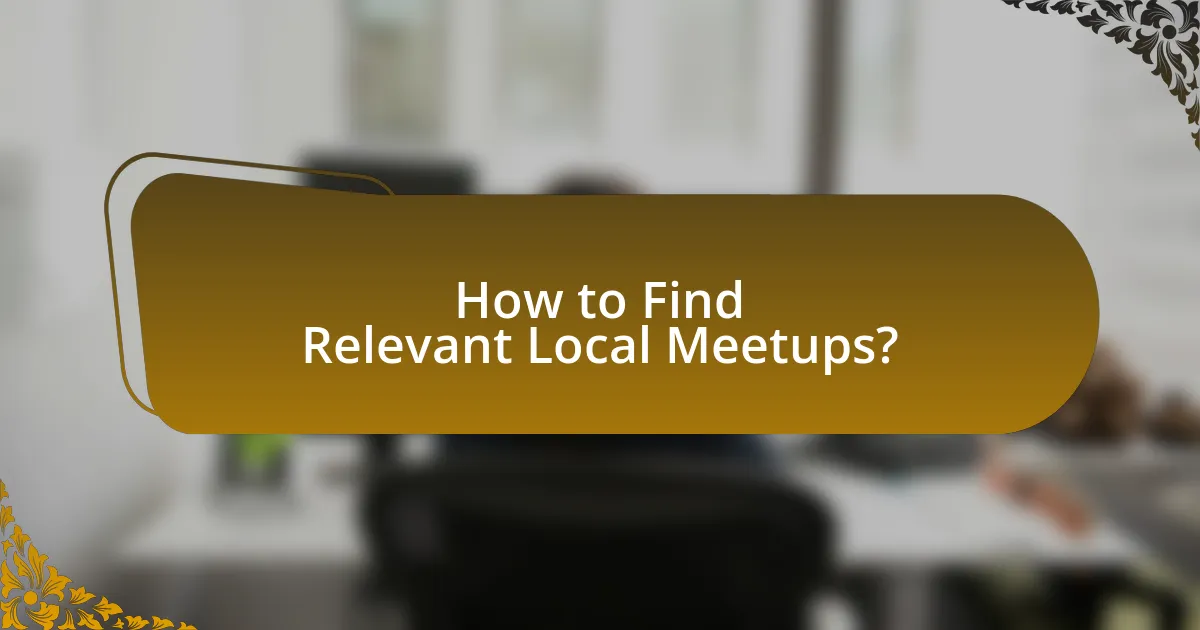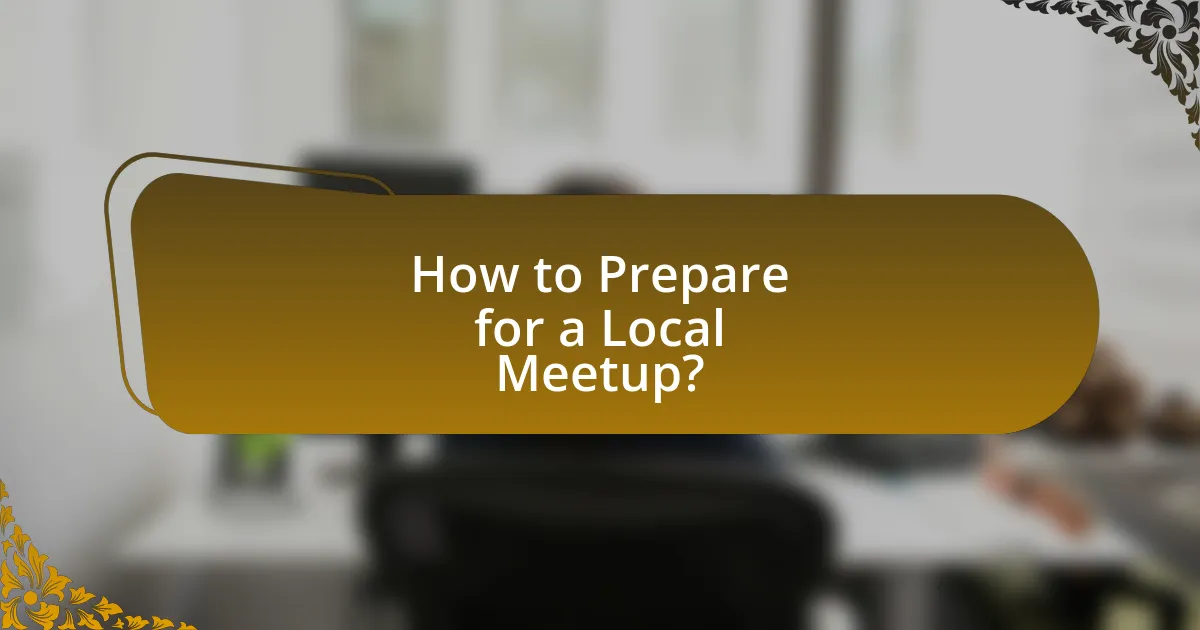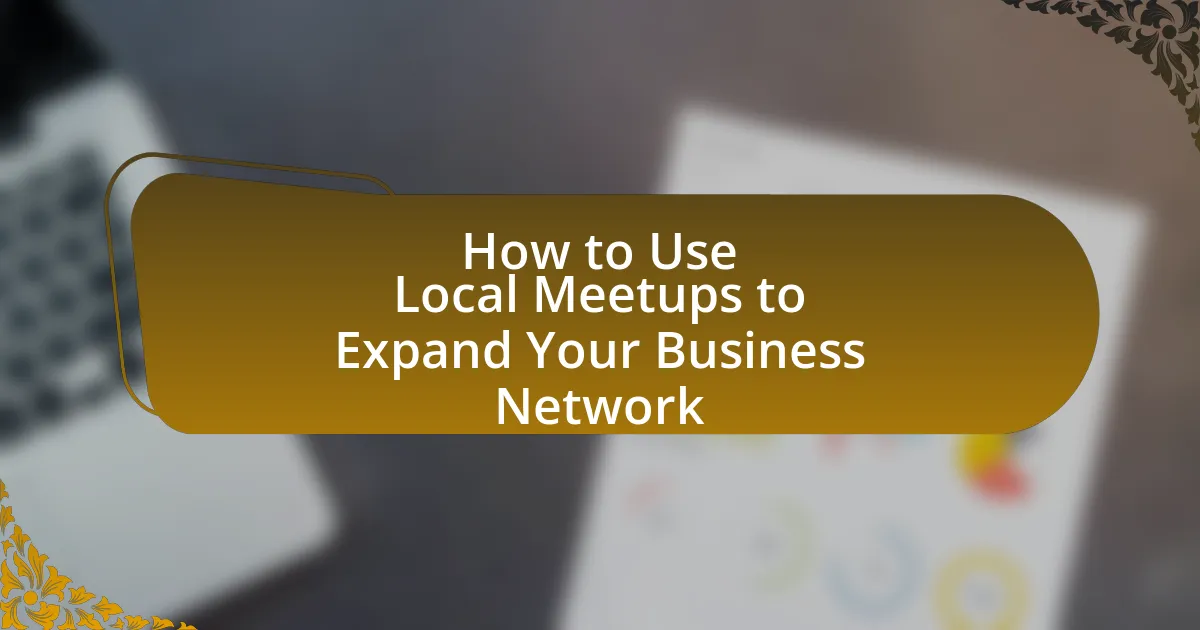Local meetups are organized gatherings that facilitate networking, learning, and collaboration among individuals with shared interests or goals. This article explores how local meetups can effectively expand business networks by providing opportunities for personal connections, knowledge sharing, and potential partnerships. It discusses the types of professionals who typically attend, the advantages for small businesses, and strategies for finding and preparing for relevant meetups. Additionally, the article emphasizes the importance of follow-up actions and maintaining connections to maximize networking efforts, ultimately highlighting the role of local meetups in fostering community engagement and business growth.

What are Local Meetups and Their Purpose?
Local meetups are organized gatherings of individuals who share common interests or goals, often focused on networking, learning, or collaboration. Their primary purpose is to facilitate connections among participants, allowing them to exchange ideas, share experiences, and build professional relationships. According to Meetup.com, over 35 million people have attended local meetups, highlighting their effectiveness in fostering community engagement and networking opportunities.
How do local meetups facilitate networking opportunities?
Local meetups facilitate networking opportunities by providing a structured environment for individuals to connect and share ideas. These gatherings encourage face-to-face interactions, which are essential for building trust and rapport among participants. Research indicates that 85% of jobs are filled through networking, highlighting the importance of personal connections made during such events. Additionally, local meetups often attract like-minded individuals with similar interests or professional goals, fostering collaboration and potential partnerships. This environment not only enhances the likelihood of forming valuable relationships but also increases access to resources and knowledge sharing within the community.
What types of professionals typically attend local meetups?
Local meetups typically attract a diverse range of professionals, including entrepreneurs, freelancers, tech industry specialists, marketers, and small business owners. These individuals attend to network, share knowledge, and collaborate on projects. According to a survey by Meetup.com, 70% of attendees are looking to connect with others in their field, indicating a strong interest in professional development and networking opportunities.
How do local meetups differ from other networking events?
Local meetups differ from other networking events primarily in their focus on community engagement and informal interactions. Unlike larger networking events that often prioritize formal presentations and structured agendas, local meetups foster a more relaxed atmosphere, encouraging participants to connect on a personal level. This format allows for deeper conversations and relationship-building, which can lead to more meaningful professional connections. Additionally, local meetups typically cater to specific interests or industries, providing targeted networking opportunities that are often more relevant to attendees compared to broader networking events.
Why are local meetups important for business expansion?
Local meetups are important for business expansion because they facilitate networking opportunities that can lead to partnerships, collaborations, and customer acquisition. Engaging with local communities allows businesses to build relationships with potential clients and industry peers, enhancing visibility and credibility. According to a study by the Harvard Business Review, 70% of jobs are found through networking, highlighting the significance of personal connections in business growth. Additionally, local meetups provide a platform for businesses to showcase their products or services directly to interested audiences, fostering immediate feedback and market insights.
What advantages do local meetups provide for small businesses?
Local meetups provide small businesses with networking opportunities, increased visibility, and community engagement. These gatherings allow small business owners to connect with potential customers, partners, and other entrepreneurs, fostering relationships that can lead to collaborations and referrals. According to a study by the Small Business Administration, 70% of small businesses report that networking has been crucial for their growth. Additionally, local meetups enhance brand awareness by allowing businesses to showcase their products or services directly to the community, which can result in increased sales and customer loyalty.
How can local meetups enhance community engagement?
Local meetups enhance community engagement by fostering personal connections among residents, which leads to increased collaboration and support within the community. These gatherings provide a platform for individuals to share ideas, resources, and experiences, thereby strengthening social ties. Research indicates that communities with strong social networks experience higher levels of civic participation and volunteerism, as evidenced by a study published in the American Journal of Community Psychology, which found that social interactions at local events significantly boost community involvement and trust.

How to Find Relevant Local Meetups?
To find relevant local meetups, utilize platforms like Meetup.com, Eventbrite, and Facebook Events, which aggregate local gatherings based on interests and location. These platforms allow users to filter events by categories such as business, technology, or networking, ensuring that the meetups align with specific professional goals. According to Meetup’s statistics, over 35 million people use the platform to connect through shared interests, highlighting its effectiveness in finding relevant local events. Additionally, joining local community groups or professional organizations can provide insights into upcoming meetups that may not be widely advertised, further enhancing networking opportunities.
What platforms can be used to discover local meetups?
Platforms that can be used to discover local meetups include Meetup.com, Facebook Events, Eventbrite, and LinkedIn. Meetup.com is specifically designed for organizing and finding local gatherings based on shared interests, boasting millions of active users and events. Facebook Events allows users to explore local happenings through their social network, making it easy to find gatherings among friends and community members. Eventbrite serves as a ticketing platform that lists various events, including meetups, and provides options for users to filter by location and category. LinkedIn also features events that can help professionals connect with others in their industry or area. These platforms collectively facilitate the discovery of local meetups, enhancing networking opportunities.
How can social media aid in finding local networking events?
Social media can significantly aid in finding local networking events by providing platforms where event organizers promote their gatherings and users share information. Platforms like Facebook, LinkedIn, and Meetup allow users to search for events based on location and interests, making it easier to discover relevant networking opportunities. For instance, Facebook Events enables users to filter events by their geographical area, while LinkedIn groups often post about industry-specific meetups. According to a 2021 survey by Eventbrite, 62% of event organizers use social media to promote their events, highlighting its effectiveness in reaching potential attendees.
What role do community boards and local organizations play?
Community boards and local organizations serve as vital platforms for fostering connections and collaboration within a community. They facilitate networking opportunities by organizing events, meetings, and discussions that bring together local businesses, residents, and stakeholders. For instance, community boards often address local issues and provide a forum for residents to voice concerns, which can lead to partnerships and business opportunities. Additionally, local organizations frequently host workshops and networking events that enable businesses to showcase their services and connect with potential clients or collaborators, thereby enhancing their visibility and reach within the community.
How can you assess the value of a local meetup before attending?
To assess the value of a local meetup before attending, research the event’s agenda, speakers, and attendee demographics. Analyzing the agenda reveals the topics covered and their relevance to your interests or business goals. Evaluating the speakers’ backgrounds provides insight into their expertise and potential networking opportunities. Additionally, reviewing attendee demographics helps determine if the participants align with your target audience or industry, enhancing the likelihood of valuable connections. For instance, a meetup focused on digital marketing with experienced speakers and a majority of attendees from tech startups would likely offer significant networking potential for someone in that field.
What criteria should you consider when evaluating a meetup?
When evaluating a meetup, consider the relevance of the topic to your business goals, the expertise of the speakers, the demographics of the attendees, and the venue’s accessibility. Relevance ensures that the meetup aligns with your networking objectives, while knowledgeable speakers can provide valuable insights. Understanding the demographics helps gauge potential connections, and an accessible venue encourages attendance. These criteria collectively enhance the likelihood of meaningful networking opportunities.
How can past attendee feedback influence your decision?
Past attendee feedback can significantly influence your decision by providing insights into the effectiveness and appeal of previous meetups. Analyzing feedback allows you to identify strengths and weaknesses in event organization, content, and networking opportunities. For instance, if attendees consistently highlight the value of specific speakers or topics, you can prioritize similar themes in future events to enhance engagement. Additionally, feedback may reveal logistical issues, such as venue suitability or scheduling conflicts, enabling you to make informed adjustments that improve overall attendee satisfaction. This data-driven approach ensures that your decisions are aligned with the preferences and needs of your target audience, ultimately leading to more successful networking events.

How to Prepare for a Local Meetup?
To prepare for a local meetup, identify the event details, including the date, time, location, and agenda. Research the attendees and speakers to understand their backgrounds and interests, which can facilitate meaningful conversations. Create a personal introduction that highlights your professional background and objectives for attending the meetup. Bring business cards to share your contact information easily. Additionally, prepare questions or topics to discuss, ensuring you engage actively during the event. According to a study by the Harvard Business Review, networking events can significantly enhance professional connections, making preparation essential for maximizing opportunities.
What strategies can help you make the most of your meetup experience?
To make the most of your meetup experience, actively engage with participants by initiating conversations and asking questions. This strategy fosters connections and enhances networking opportunities. Research indicates that effective networking can lead to increased business opportunities, as 70% of jobs are found through networking, according to a study by the U.S. Bureau of Labor Statistics. Additionally, preparing an elevator pitch about your business can help you communicate your value succinctly, making it easier for others to understand your goals and how they can assist you.
How should you approach networking during the event?
To effectively approach networking during the event, engage actively with attendees by initiating conversations and showing genuine interest in their work. This method fosters connections and encourages reciprocal dialogue, which is essential for building a professional network. Research indicates that 70% of jobs are found through networking, highlighting the importance of making meaningful interactions at such events. By asking open-ended questions and listening attentively, you can create a rapport that may lead to future collaborations or opportunities.
What materials should you bring to a local meetup?
To a local meetup, you should bring business cards, a notepad, and a pen. Business cards facilitate networking by providing contact information easily, while a notepad and pen allow for jotting down important details or insights from conversations. According to a study by the Harvard Business Review, effective networking often relies on the ability to follow up with new contacts, which is streamlined by having business cards readily available.
How can you effectively introduce yourself at a meetup?
To effectively introduce yourself at a meetup, start with a clear and concise statement of your name and what you do. For example, “Hi, I’m John Smith, a digital marketing consultant specializing in social media strategies.” This approach establishes your identity and area of expertise immediately. Following this, include a brief mention of your goals for attending the meetup, such as, “I’m here to connect with other professionals in the industry and explore potential collaborations.” This not only provides context but also invites conversation. Research indicates that introductions that include both personal and professional elements foster better networking opportunities, as they create a more relatable and engaging interaction.
What key points should be included in your introduction?
The introduction should include the purpose of the article, which is to explain how local meetups can effectively expand a business network. It should also highlight the importance of networking in business growth, supported by statistics indicating that 85% of jobs are filled through networking, according to a LinkedIn survey. Additionally, the introduction should briefly mention the benefits of attending local meetups, such as building relationships, sharing knowledge, and discovering new opportunities. This sets the stage for the detailed exploration of strategies and tips that will follow in the article.
How can you tailor your introduction to different audiences?
To tailor your introduction to different audiences, you should first identify the specific interests and needs of each audience segment. For instance, when addressing entrepreneurs, emphasize your business achievements and networking goals, while for potential clients, focus on how your services can solve their problems. Research indicates that customizing communication increases engagement; a study by the Journal of Marketing found that personalized messages can boost response rates by up to 29%. By aligning your introduction with the audience’s expectations, you enhance relatability and effectiveness in networking situations.

What Follow-Up Actions Should You Take After a Meetup?
After a meetup, you should send personalized follow-up messages to the attendees you connected with. This action reinforces the relationship established during the meetup and keeps the conversation going. Research indicates that timely follow-ups, ideally within 24 to 48 hours, significantly increase the likelihood of maintaining connections, as people are more likely to remember interactions shortly after they occur. Additionally, sharing relevant resources or information discussed during the meetup can provide value and demonstrate your engagement, further solidifying the relationship.
How can you maintain connections made at local meetups?
To maintain connections made at local meetups, regularly follow up with attendees through personalized messages or emails. This approach reinforces the relationship and shows genuine interest in their work or ideas. Research indicates that consistent communication can enhance networking effectiveness; for instance, a study by the Harvard Business Review found that maintaining contact with professional connections increases the likelihood of collaboration and support. Additionally, engaging with them on social media platforms can keep the connection active and provide opportunities for ongoing interaction.
What methods are effective for following up with new contacts?
Effective methods for following up with new contacts include sending personalized emails, connecting on social media platforms, and scheduling follow-up meetings. Personalized emails allow for a direct and tailored approach, reinforcing the connection made during the initial meeting. Research indicates that personalized communication increases response rates by up to 29%. Connecting on social media, particularly LinkedIn, helps maintain visibility and facilitates ongoing engagement. Scheduling follow-up meetings, whether virtual or in-person, provides an opportunity to deepen the relationship and explore potential collaborations. These methods are proven to enhance networking effectiveness and foster long-term professional relationships.
How can you leverage social media for post-meetup engagement?
You can leverage social media for post-meetup engagement by creating dedicated event pages and sharing follow-up content that encourages interaction. This approach allows attendees to continue discussions, share insights, and network further after the meetup. For example, using platforms like Facebook or LinkedIn to post photos, videos, and key takeaways from the event can stimulate ongoing conversations and foster community. Research indicates that 78% of people engage with brands on social media after attending events, highlighting the effectiveness of this strategy in maintaining engagement and building relationships.
What are some best practices for maximizing your networking efforts?
To maximize your networking efforts, actively engage in local meetups relevant to your industry. Attending these events allows you to connect with like-minded professionals, share insights, and build relationships that can lead to business opportunities. Research shows that 70% of jobs are found through networking, highlighting the importance of personal connections in professional growth. Additionally, follow up with contacts after the event to reinforce relationships and explore potential collaborations, as consistent communication is key to maintaining a strong network.
How can you create a networking plan based on your meetup experiences?
To create a networking plan based on your meetup experiences, first, analyze the connections made during past meetups, identifying key individuals and their relevance to your goals. Next, categorize these contacts by industry, potential collaboration opportunities, and mutual interests to prioritize follow-ups. For instance, if you met a marketing professional who expressed interest in your product, schedule a coffee meeting to explore synergies. Additionally, set specific networking goals, such as attending a certain number of meetups per month or reaching out to a specific number of contacts weekly. This structured approach enhances relationship-building and maximizes the value derived from each meetup experience.
What common mistakes should you avoid in networking?
Common mistakes to avoid in networking include failing to follow up after initial meetings, being overly self-promotional, and neglecting to listen actively. Following up is crucial; research shows that 80% of sales require five follow-ups after the initial contact, highlighting the importance of maintaining connections. Being overly self-promotional can alienate potential contacts; effective networking is about building relationships, not just selling oneself. Lastly, neglecting to listen actively can hinder meaningful conversations; studies indicate that effective listening improves relationship-building and trust, essential components of successful networking.
